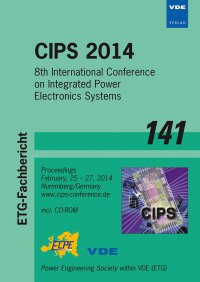Comparison of thermo-mechanical reliability of high-temperature bonding materials for attachment of SiC devices
Konferenz: CIPS 2014 - 8th International Conference on Integrated Power Electronics Systems
25.02.2014 - 27.02.2014 in Nuremberg, Germany
Tagungsband: CIPS 2014
Seiten: 7Sprache: EnglischTyp: PDF
Persönliche VDE-Mitglieder erhalten auf diesen Artikel 10% Rabatt
Autoren:
Li, Jianfeng; Yaqub, Imran; Corfield, Martin; Agyakwa, Pearl; Johnson, Christopher Mark (Power Electronics, Machines and Control Group, University of Nottingham, NG7 2RD, UK)
Inhalt:
This paper presents a comparative study of the thermo-mechanical reliability of four bonding materials for attaching SiC devices. They include the standard high-temperature Pb5Sn and Au12Ge solder alloys, the emerging Zn5Al0.1Ge solder alloy and paste of Ag nanoparticles. Firstly, the bonding processes, especially the soldering process for the Zn5Al0.1Ge solder alloy have been investigated. Secondly, samples for thermo-mechanical reliability tests have been prepared with the four bonding materials using SiC devices in combination with standard Al-wire bonded interconnects and Si3N4-based substrates. Finally, the reliability of the prepared samples have been tested under passive thermal cycling between -60 °C and +190 °C and -55 °C and +190 °C, and monitored in real time by measuring the onstate/ forward voltage drop across the samples for a fixed on-state current of 100 mA. The structural integrity of the samples have also been characterised by three-dimensional X-ray computed tomography during/after thermal cycling. It was found that an additional Ag finish of 100 nm to 2 µm in thickness was needed to significantly improve the solderability of Zn5Al0.1Ge solder alloys on Si3N4-based substrates with ~5 µm thick NiP finish. After 250 thermal cycles at - 60 °C and 190 °C plus 390 thermal cycles between -55 °C and 190 °C, no appreciable change in the on-state/forward voltage drop across the samples had been observed. In addition, the Au12Ge, Zn5Al0.1Ge solder joints and sintered Ag joint were found to degrade more slowly than the Pb5Sn solder joint.


